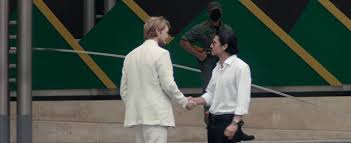
As we reach the end of the first quarter of 2024, along comes a film that is so beautifully moving that it catapults into the lead for film of the year honours. Andrew Haigh has brought us Weekend, Lean on Pete and 45 Years among others, all powerful portrayals of individuals against the odds. Here, he presents Adam (Andrew Scott), a 42-year old writer living almost alone in a tower block in London. He’s gay and battling writer’s block as his topic – the death of his parents in a car crash 30 years previously – is not going well.

He meets Harry (Paul Mescal), resident in the same block, or rather, Harry inveigles his way into Adam’s life and very slowly a relationship develops.

Concurrently, Adam is revisiting his childhood home in Croydon and in a twist of ghostdom or magic realism is meeting up again with his parents (at the age when they died). They have 30 years to catch up.

Mother (Claire Foy) is a sheltered suburban housewife and Father (Jamie Bell) is a bit of a man’s man.

Adam tells them he is gay and recounts some details of his past and present. It becomes apparent that he is a loner and has never really worked through their death in an accident. A series of conversations both with his parents and with Harry function as a type of processing of this long-held grief and as a spark to move into the future, as seen in this tentative new relationship.

Put this way, the film seems straightforward but it is not. The dialogues are rich and unpredictable and the ghost element makes it hard to know exactly what is true and what is in his mind or dreams.

The acting, especially Andrew Scott is excellent and Scott conveys a loss and damaged adult with sublime naturalness and without pity.
Jamie Ramsay’s photography captures the blurry interface between worlds well – one `dream`is a drug propelled visit to a nightclub and Emilie Lavienaise Farrouch gives us an excellent soundscreen of music and noises.

But most of all Haigh in his direction of this film and in adapting a Japanese novel for the screenplay brings us a deep honest work about grief, loss, openness and solitude with a central gay element factored in.

A really quite lovely if rather melancholic experience which ends by showcasing The Power of Love by Frankie Goes to Hollywood and enhances the reputation of that excellent song.

5 stars



































































